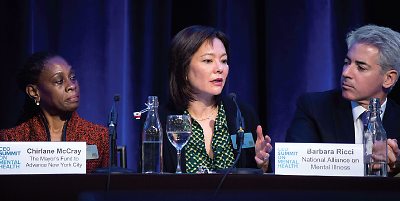The CEOs of 12 corporations met last month at the New York Stock Exchange to discuss fostering a workplace that promotes, supports, and improves the mental health of employees and their families.
The event—the CEO Summit on Mental Health—was officially sponsored by the National Alliance on Mental Illness of New York City (NAMI-NYC Metro) and the Northeast Business Group on Health (NEBGH) with collaborators that included the Kennedy Forum, the Mayor’s Fund to Advance New York City, and the APA Foundation’s Partnership for Workplace Mental Health.
Psychiatry was represented at the summit by Herbert Pardes, M.D., of New York-Presbyterian Hospital, where he is executive vice chair of the Board of Trustees; Paul Summergrad, M.D., of Tufts University Medical Center, where he is chair of the Department of Psychiatry; and Giovanni Colella, M.D., co-founder and CEO of Castlight Health.
The CEOs embraced four key principles for moving toward developing a work environment at their individual companies and organizations that promotes and supports better mental health:
•
Know the Impact: Develop an in-depth understanding of the impact that mental illness has on society in general and the well-being of corporations and their employees.
•
Break the Silence: Create an environment that helps to erase the stigma surrounding mental illness.
•
Deliver Affordable Access: Provide mechanisms, including affordable health insurance, that allow individuals with mental illness to access quality care.
•
Build a Culture of Well-Being: Build a workplace environment that encourages individuals to support their own overall health and mental health.
Among the corporations represented were Pershing Square, Dynex Capital Inc., Ernst and Young, J. Walter Thompson Company New York, Liberty Bank, Orix Real Estate USA, The Advertising Council, and Time Equities Inc. Other “thought leaders” in attendance, were Chirlane McCray, first lady of New York City, Mayor’s Fund to Advance New York City; Barbara Ricci, board president of NAMI-NYC Metro; Laurel Pickering, president and CEO of NEBGH; Mike Thompson, principle in health care practice at PricewaterhouseCoopers; Mary Giliberti, executive director of NAMI; and Patrick Kennedy, former member of the U.S. House of Representatives, who was instrumental in the passage of the federal parity law and founder of the Kennedy Forum.
“The business community is a crucial partner in changing how America addresses mental health,” said APA CEO and Medical Director Saul Levin, M.D., M.P.A. “The APA Foundation’s Partnership for Workplace Mental Health was pleased to collaborate on the CEO summit because businesses, as major purchasers of health care, play an essential role in ensuring that health plans treat mental health fairly, equitably, and sufficiently.”
Discussion at the summit was lively, with many CEOs testifying to the impact that mental illness has had in their own personal lives and in their families—including one participant who related that an adult child with mental illness was currently incarcerated.
Participants also received the “Working Well Toolkit,” developed in part by the Partnership for Workplace Mental Health. It expands on the four principles embraced at the event and provides specific initiatives that can be undertaken by employers to act on the principles. Much of the substance of this toolkit comes directly from the expertise shared by leading employers and participants in mental conferences convened by NEBGH and NAMI-NYC Metro. These six summits have had more than 60 participants representing more than 40 companies and organizations.
It was noted that a report by Milliman—commissioned by APA in 2014—showed not only that the United States spends $92 billion a year via all public and private insurance on mental health services, but also that the increased general medical/surgical costs for these persons were $250 billion a year higher than those who do not use mental health services.
Moreover, individuals with mental illness and/or substance abuse disorders are far more likely to have comorbid general medical conditions and to die on average 10 to 20 years younger than those without mental disorders both due to these medical disorders and suicide. They are more likely to be admitted to inpatient and emergency medical units, and the costs of their total health care are two to three times higher than those without mental health conditions, according to the Milliman report. ■
The Milliman report can be accessed
here. The toolkit can be downloaded
here.

